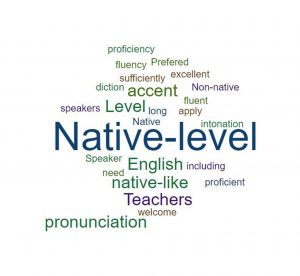What schools are looking for in their teachers, by Gerald Nikolai Smith
‘All you need is a bachelor’s degree, TEFL and 5hrs of free time per week’ reads a job post from a reputable online ESL teaching company. This attention grabber is indicative of the fast-paced job market which has exploded since 2015.
Many of us have scoured the job boards looking for the best online ESL job with a good hourly rate without any hope of getting benefits such as paid sick leave. This young job market has become a great way to work remotely, have a second income or simply get teaching experience, but what are companies looking for? Are all the jobs for Chinese companies or are other countries and regions in the mix?
I gathered data from three major ESL job sites with over 50 online ESL teacher positions. I noted down where the company was located (East Asia, Eastern and Western Europe, Southwest Asia, North America and Latin America), the salary range, if they hired non-native speakers or what phrasing they used to describe a teacher’s English proficiency, if they required passports from certain countries or a teaching certificate (CELTA, TEFL, TESOL, etc).

From this data, certain trends appeared. However, it should be noted that the data pool for most of these regions is too small to make any broad statements. For example, there were too few job postings in Southeast Asia to make many (if any) assumptions. Still, some trends did emerge.
Eastern Asia is the biggest market for online ESL teachers, with China offering the most posts. However, the Chinese government has recently banned online teachers living abroad from teaching its under-16s.
Big companies, like VIPKid and GoGoKid have announced they will follow the law, but smaller groups may try to get round it. After all, NNESTs were already legally excluded from Chinese online jobs and the law required teachers to hold a teaching certificate, such as a TEFL. Yet four of the Chinese jobs surveyed said they hired NNESTs even though this is illegal. The ad which read “All you need is a bachelor’s degree…” was not only misleading, it broke the law.
South Korea also prefers NESTs, but most companies do not require certificates. East Asia is the only region which explicitly

states a preference for accents, with North American and UK accents the most popular.
In Western Europe, the second-biggest market for online ESL jobs, employers seem to prefer CELTAs, particularly in the United Kingdom. However, many accept TEFL and TESOL certificates too, though TESOL

normally refers to the certificate from Trinity College London.
European companies often do not advertise salaries, instead preferring to decide this based on qualifications and experience.
Good news for NNESTs: none of the jobs posted in Western Europe said they preferred or required a NEST. Instead, companies are using a variety of different phrases. Two of the

jobs asked for English level qualifications (C2 level or IELTs band 8/9).
In Russia, companies are split about NNESTs. Interestingly, the companies hiring NNESTs require teaching certificates, while ones hiring NESTs do not. NNEST or NEST, it is unlikely to be bad at over $13 per hour.
The lack of posts from regions outside of Europe and East Asia showed that, despite the increase in digital learning worldwide because of the pandemic, there were very few online ESL opportunities: four in Southeast Asia, two in the US, two in Latin America, one in Southwest Asia.
Here are possible trends for the future: as over half of online ESL jobs are based in East Asia, the field will continue to explicitly discriminate against NNESTs and teachers with nonstandard accents. The Western Europe market may continue to grow as digital learning becomes a new norm, which could help NNESTs, as it is illegal to discriminate against people based on native languages in the EU. Southwest Asia may expand online as well, because of its large number of face-to-face ESL jobs and the growing economies of Indonesia, Vietnam, and Malaysia. The industry’s future is full of possibilities.

Gerald Smith is an online ESL teacher and MSc journalism student at the University of Stirling. A native Texan, he lives in a small town in Scotland.
Two CELTA grads with very different opportunities
The CELTA has been a quick and thorough way for teachers starting out in EFL/ESL to get qualified and gain the necessary skills to teach. A CELTA signals to potential employers that a candidate is knowledgeable and serious about English education and yet, not everyone with a CELTA gets the same opportunities.
“You need to be British with a British passport and a British accent,” says Rachel Lewis, who got her CELTA last year from Live Language Glasgow. Rachel, an Indian PhD student at the University of Glasgow and ESL teacher, was speaking about her experience job seeking post-CELTA in the UK and online.
Angela Bagni, who is Scottish-Italian, took the same CELTA course with Rachel. “Before CELTA, I wasn’t that good at grammar and I hadn’t a clue what was needed. After the CELTA, my [confidence] was a bit higher,” she says. Prior to the CELTA, Angela already had a job lined up in Italy teaching with a private education company and says post-CELTA, she wanted “job security”.
Before the CELTA course, Rachel thought, “If I get the CELTA, I’ll be eligible for loads of jobs.”
However, this was not the case. Rachel applied to many places and only had one offer in the Midlands, miles away from Glasgow.
“I apply online, and just from my CV and telephone number, I’m fine. You wouldn’t guess I was Indian by my photo. It’s only when it comes to a Zoom call or [they] ask for my passport, that I’m blocked. This has happened four times at least. There’s a phone or Zoom interview and then they say, we can’t take you,” says Rachel.
Rachel takes such discrimination without flinching. She speaks about it plainly without anger, and even with a chuckle every now and then. But she is also honest about the racism and xenophobia she’s experienced.
“In the UK, if you’re offering an English course, you have to be white or at least look white, so I don’t think the CELTA makes much of a difference,” she says.
Rachel and Angela are similar in many ways. Both have degrees above a Bachelor, speak multiple languages and have a passion for English teaching. They are also different: Rachel speaks four languages and wants to work in the UK or online. Angela is bilingual and wants to work abroad or online.
I assumed Rachel was a non-native speaker of English, as many recruiters and companies might, but she corrected me saying, “Technically, I am a native English speaker. That is my first language and it’s the only language we spoke at home. Indian English is about 200 years [old]. It’s not so different from Australian, South African or American English.”
This point is critical to the discrimination Indian and other South Asian teachers face, and it is one of the reasons scholars have been arguing whether the terms native or non-native should be used. Rachel is also honest about the implications of the discrimination she faces, saying, “For a white country, for a first world country, we [Indians] are not English enough… It’s linguistic racism.”
While Angela did not face racism in her career path, she noticed many online job opportunities which advertised for native speakers only or British passport needed. In brick-and-mortar Italian schools however, requirements are different from the UK and other parts of the world.
“Italians are more relaxed when it comes to non-native teachers. They look at the qualification more than the person,” says Angela.
Looking at the qualification rather than the person can also be problematic, but it can help ease xenophobic or racist discrimination.
Angela also faced a different type of discrimination: sexism. “[A recruiter] asked me to send my teaching video. I didn’t hear back from him for ages and then when I messaged him, he said, ‘Sorry, it looks like we were looking for a male teacher at this time’.”
Angela currently works as an online EFL teacher for Chinese students. She enjoys the freedom the role affords her, but bemoans the fact she gets fined for taking a day off.
Rachel mainly works as maths tutor as well as an admin head for an education company. She teaches two to three English classes per week.
When asked whether she regrets taking the CELTA, Rachel says, “I’m happy I did it. I got more than I was expecting, especially in terms of lesson planning.”
In an ideal world, a certification like a CELTA along with a passion for sharing language would be enough for a professional to get a job in this field, whether it’s online or in person. Unfortunately for Rachel, Angela and indeed all of us, we do not live in such a world.





